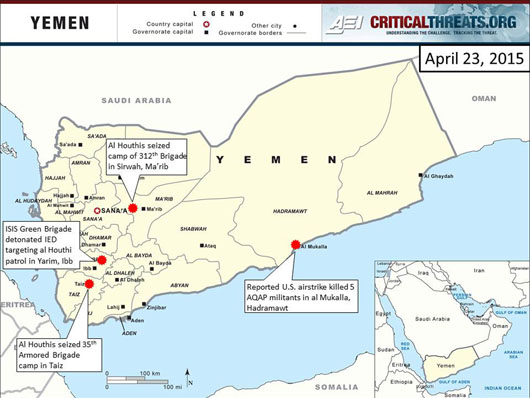The al Houthis have portrayed the end of the Saudi-led Operation Decisive Storm as a victory and continue to fight for control of territory in eastern and central Yemen. The Saudi-led coalition is continuing its air campaign under the new campaign, Operation Restoring Hope. There does not yet appear to be sufficient momentum to bring the al Houthis to the negotiating table in order to reach a political solution in Yemen.
The al Houthis continue to seize and hold territory despite the continuation of Saudi-led coalition airstrikes. The al Houthis seized the 35th Armored Brigade camp in Taiz city, Taiz, on April 22 after a week of clashes with the brigade. Al Houthi militants also seized the 312th Brigade military base in Sirwah, Ma’rib, on April 22. The Saudi-led air campaign appears to continue despite the end of Operation Decisive Storm and the beginning of Operation Restoring Hope. Airstrikes targeted the al Houthis in Taiz, Ibb, Ma’rib and Aden on April 22 and 23, but have not rolled back al Houthi expansion in Taiz, Lahij, Aden, and Shabwah governorates. While Saudi officials claimed that Operation Decisive Storm had completed its original objectives, the al Houthi movement has likewise claimed the end of the operation as a victory.
Pro-Islamic State in Iraq and al Sham (ISIS) fighters are establishing a presence in central Yemen. Unofficial pro-ISIS Twitter accounts announced the creation of the Wilayat Green Brigade, which reportedly includes the territory between Taiz city and Ibb city (source available upon request). The Wilayat Green Brigade claimed credit for an improvised explosive device (IED) attack targeting an al Houthi convoy in Yarim, Ibb, on April 22, although the attack could not be independently confirmed. ISIS fighters claim to be operating throughout southern and central Yemen, but their operational strength remains unclear. The security vacuum created by the al Houthi conflict has enabled ISIS to increase its footprint in Yemen.
The U.S. is concerned Iran is supplying weapons to the al Houthis. President Barack Obama warned Iran on April 21 not to deliver weapons to the al Houthis. U.S. Secretary of Defense Ashton Carter also expressed his concern on April 22 that Iranian cargo ships may be carrying weapons to the al Houthis. Carter declined to state whether U.S. warships in the Gulf of Aden would attempt to interdict the Iranian cargo ships. The U.S. continues to support Saudi Arabian military operations in Yemen and has called for political dialogue between warring factions.
The U.S. continues counter-terrorism operations in Yemen. A reported U.S. airstrike killed five al Qaeda in the Arabian Peninsula (AQAP) militants in al Mukalla, Hadramawt on April 21. Unconfirmed reports from unofficial pro-AQAP Twitter accounts suggest that the strike may have killed AQAP propagandist Muhannad Ghallab (source available upon request). This is the fourth reported U.S. airstrike in Yemen in April. The U.S. airstrike that killed AQAP spiritual leader Ibrahim al Rubaish on April 12 was the first such airstrike in Yemen since at least February 28.
The al Houthis have expressed willingness to engage in dialogue on the condition that the Saudi-led coalition airstrikes halt. The al Houthi spokesman Mohammad Abdul Salam said that the al Houthi movement desired a return to UN-led dialogue, but that Saudi-led coalition airstrikes in Yemen must stop. Oman is reportedly planning to announce a peace plan to end the Yemen conflict that calls for new presidential and parliamentary elections in Yemen and also includes a proposal to include Yemen in the Gulf Cooperation Council. The al Houthis refuse to abide by UN Security Council Resolution 2216, which calls for the militants to disarm fully and withdraw from seized territory. The al Houthis have sought the cessation of Saudi-led airstrikes before they say they are willing to put down their arms.
The Yemeni military’s and tribes’ focus on battling the al Houthis has allowed ISIS cells to emerge in central Yemen. AQAP continues its operations in eastern and southern governorates and will be able to continue consolidating control of territory. The resumption of U.S. targeted airstrikes has degraded AQAP leadership, but the U.S. does not have a partner to combat AQAP on the ground.
← PREVIOUS |
NEXT → |

